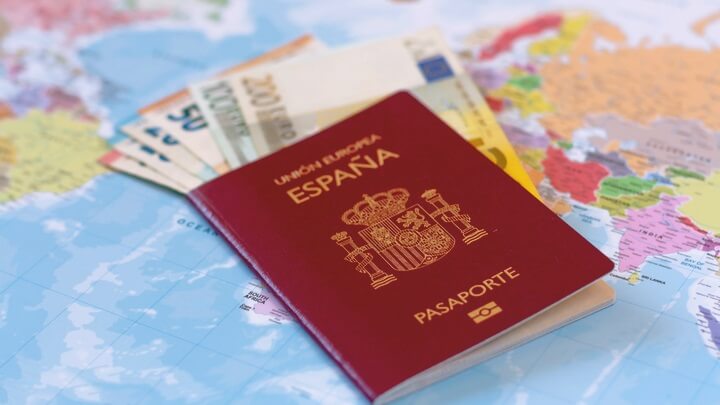Spain Golden Visa: Program ending and other options
The Golden Visa program in Spain ended in April 2025. Here's everything you need to know, including other visa options.

Life in Spain tends to have broad appeal to expats for a number of reasons. First and foremost, it’s widely regarded as having the best year-round climate among European countries. The Southern Blanca region has an average of 320 days of sunshine per year, and low recorded rainfall.
Spain is also estimated to have 30-40% lower costs for owning property compared to the U.K., for example, with food and heating noticeably cheaper than it is in other places. Throw in Spain’s reputation for fantastic cuisine, including fresh seafood and the country’s vast array of fine wines, and it would be difficult for anyone to resist this European country’s charm.
Whether you’ve been an expat in Spain for many years or you’re considering relocating there for the first time, there’s a lot to know when it comes to the roadblocks and intricacies of becoming a citizen. That being said, many people find that enjoying the Spanish lifestyle is well worth the complex process of applying for citizenship.
Regardless of whether you’re moving to start a business, find or job or just enjoy all that Spain has to offer, this guide will walk you through the most important points and steps for becoming a Spanish citizen.
Spain is one of the many European countries that make up the EU – European Union. As a Spanish citizen you’ll have the right to vote, which gives you the ability to influence political decision making not only in Spain, but in the EU as a whole.
More importantly, you’ll be able to carry a Spanish passport, which acts as a “golden ticket” for exploring the rest of the European Union. Upon becoming a Spanish citizen, you’ll have the right to visit, live and work freely within all of the countries that belong to the EU.
The easiest way to become a Spanish citizen is through your parents – a process in which you can qualify by either origin or birth – and doesn’t require a residency period.
You’re considered Spanish by origin and can apply for citizenship by 'Option' if you have a Spanish mother or father, if you’re under the age of 18 and have been adopted by a Spaniard, or over the age of 18 and have been adopted by a Spaniard within the last two years.
Additionally, if you were born in Spain to foreign parents or if at least one parent was also born in Spain (except children of diplomats and consuls accredited in Spain), you’re eligible for Spanish citizenship by birth. The same applies if you were born in Spain to foreign parents whose identity is unknown or country of origin is undetermined (stateless or refugee status), or if neither parents’ nationality could be legally passed on to you.
If you’re unable toapply for citizenship by birth or origin, there are some other ways to become a Spanish citizen. The most common route is naturalization, for which you’re eligible to apply if you have resided legally on a permanent visa in Spain for 10 or more years, or if you’re married to a Spanish Citizen.
There are a few exceptions to the 10-year requirement. For example, refugees are eligible to apply after only five years of residence.
Nationals from Spanish-American countries are eligible to apply for citizenship after just two years of residence. Countries whose nationals are included in this policy are Andorra, the Philippines, Equatorial Guinea, Portugal and those of Sephardic origin.
The required period of residence is only one year if you’re born in Spain to legal foreign residents, married to a Spaniard, widowed from a Spaniard or the child or grandchild (even if born outside Spain) of a Spanish national by birth or residence.
Additionally, descendants of expelled Sephardic Jews from Spain can apply for Spanish citizenship without residing in Spain if they can prove special connections to Spain and pass tests on the Spanish language and history. Applications must be submitted before 1 October 2018. This restriction is liable to change as the Spanish government currently has a bill going through parliament that aims to change the law regarding those of Sephardic origin so that any applicant, Jewish or not, who can fulfill certain criteria such as having links to Sephardic culture or even knowledge of Ladino, the Judeo-Spanish language, may be offered instant naturalization.
Before one is able to apply for citizenship in Spain, in order to meet the 10 years of residence criteria he or she will need to apply for permanent residency. Permanent residents are required to have lived in Spain for at least five years.
Residency must be legal and continuous immediately prior to the application. If any of your time in Spain is as a student, that time won’t be considered legal residency and therefore cannot be applied towards applications por residencia.
Once you have legally lived in Spain for five uninterrupted years, non-EU nationals can apply for an 'EU long-term residence permit'.
A long-term residence permit allows you to stay in Spain indefinitely working or otherwise, under the same conditions as Spanish citizens.
You have to prove that you have adequate financial resources to provide for you and your dependents – such as pension, scholarship or salary – and proof of public or private health insurance with a company authorized to operate in Spain.
If you’re applying for permanent residence in Spain, you'll likely be asked to submit the following documents that should be translated into Spanish:
Applicants will also be required to prove that they’re ‘good citizens’ – financially stable with no criminal record – and be deemed by the authorities to have a ‘sufficient’ degree of integration into Spanish society. For example, being able to speak Spanish and taking part in social activities that are part of the Spanish way of life will contribute to your clout as a potential citizen.
To get a permit, you have to apply at the Civil Registry closest to you. You’ll need to take along the required supporting documents for your Spanish citizenship application plus a completed Spanish citizenship application form.
You can apply for Spanish citizenship if you’re 18 or older, 14 or older with legal assistance, or citizenship can be applied for on your behalf by a legal guardian if you’re younger than 14.
Those applying for Spanish Citizenship through residency will fill out this application form and submit it at the Spanish Civil Registry (Registro Civil) closest to their home. If an applicant resides outside of Spain, they may apply at their nearest Spanish consulate.
Applicants will need the following documentation and materials:
The fee to process a citizenship application can range from EUR 60-100. If your application is rejected for whatever reason, the fee is non-refundable.
If you’re funding your citizenship application process from your account back home, use Wise to get the real exchange rate and cut out expensive international bank transfer fees.
Unless you’re from a Spanish-American country, you’ll have to renounce your previous nationality in order to become a Spanish Citizen. Sephardic Jews and descendants, however, are entitled to maintain their original citizenship, while enjoying dual nationality.
Spanish-American countries include: Argentina, Bolivia, Brazil, Chile, Colombia, Costa Rica, Cuba, Dominican Republic, Ecuador, El Salvador, Guatemala, Honduras, Mexico, Nicaragua, Panama, Paraguay, Peru, Puerto Rico, Uruguay and Venezuela.
Applications can be submitted entirely online using the Spanish government’s SEDE electrónica or in person at your correspondingCivil Registry. Most civil registries will require an appointment in order to turn in documentation.
The government has no set time frame for resolving citizenship applications. As they say in Spain “las cosas de pálacio van despacio.” As such, expect your application to be processed in ‘Spanish time’- that can mean as long as eight months.
You’ll lose your Spanish citizenship if you reside abroad for more than three years and either use your old nationality or take up another nationality. However, within that three-year period if you declare your desire to keep your Spanish nationality to the Civil Registry, it may be possible to temporarily live abroad.
Once you're deemed a Spanish Citizen, you can apply for a Spanish Passport.
If you’re not already familiar with money and banks in Spain you’ll want to do a bit of research or, if you haven’t already, make sure toopen a bank account to help cut down on costs.
Good luck on becoming a Spanish citizen!
*Please see terms of use and product availability for your region or visit Wise fees and pricing for the most up to date pricing and fee information.
This publication is provided for general information purposes and does not constitute legal, tax or other professional advice from Wise Payments Limited or its subsidiaries and its affiliates, and it is not intended as a substitute for obtaining advice from a financial advisor or any other professional.
We make no representations, warranties or guarantees, whether expressed or implied, that the content in the publication is accurate, complete or up to date.

The Golden Visa program in Spain ended in April 2025. Here's everything you need to know, including other visa options.

Applying for the Family Reunification Visa Spain? Learn all about the application process, costs, and processing times to reunite with loved ones.

Want to learn about property taxes in Spain? This guide covers types of property taxes and how they are calculated to help you navigate the process.

Wondering how to get a Spanish work visa? Take a look at our overview to learn about the necessary steps, documents, and processes for Americans.

Are you looking for the best property management companies in Spain? Find out all about the top local providers to take care of your home overseas.

Wondering how to get an NIE in Spain? Take a look at our overview to learn about the necessary steps, documents, and application process for Americans.